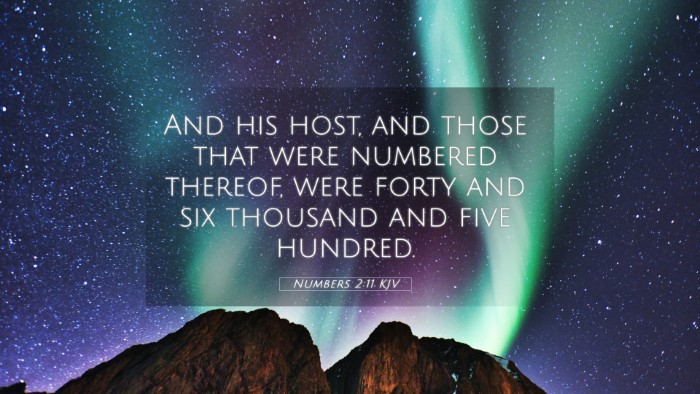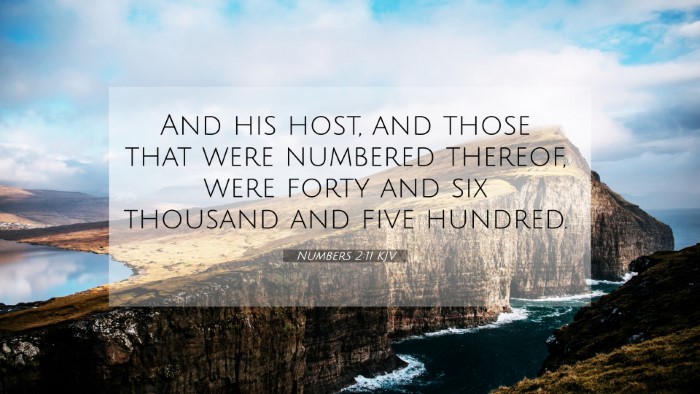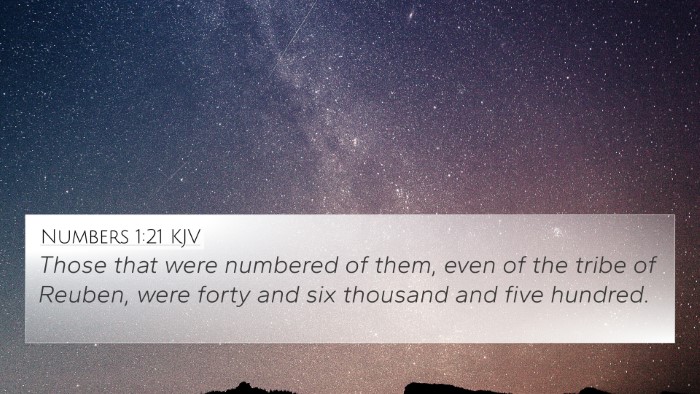Understanding Numbers 2:11
Numbers 2:11 states, "And those that do pitch next unto him shall be the tribe of Issachar: and Nethaneel the son of Zuar shall be captain of the children of Issachar." This verse is rich in meaning, reflecting God’s order and organization among His people as they journey through the wilderness. Below, we explore the insights derived from various public domain commentaries, offering a comprehensive look at its significance, particularly regarding the tribe of Issachar, its captain, and the importance of tribal organization.
Commentary Insights
- Matthew Henry:
Henry emphasizes the structural aspect of the Israelite encampment, where each tribe had its designated position. The reference to Issachar highlights the importance of order in the community of faith, as each tribe's place was dictated by divine appointment. Henry mentions that the order of the tribes signifies God's sovereignty and the role of each individual within the larger framework of the Israelite nation.
- Albert Barnes:
Barnes notes the significance of the tribal leadership, specifically focusing on Nethaneel as the captain of Issachar. He points out that leadership within the tribes illustrates God's chosen individuals to guide and lead, reflecting both responsibility and honor. The captainship is indicative of the military and administrative structure necessary during their wanderings in the wilderness.
- Adam Clarke:
Clarke provides an analytical perspective, suggesting that the positioning of tribes around the Tabernacle was both practical and symbolic. The tribe of Issachar is recognized for their wisdom, thus contributing not only to the logistical needs of the camp but also to the spiritual guidance of the people. Clarke also highlights the prophetic nature of Issachar's future, tying it to broader biblical themes.
Theological Themes
This verse can be connected to various theological themes, including divine order, leadership roles, and community organization in faith. Each tribe represents a different facet of Israel’s identity and mission. The tribe of Issachar, known for its wisdom, underscores the importance of discernment and understanding in the believer's journey.
Connections with Other Scriptures
Several Bible verses relate to Numbers 2:11, offering deeper insights through cross-referencing:
- Genesis 49:14-15: The blessings of Jacob upon Issachar reflect the tribe's characteristics of strength and knowledge.
- 1 Chronicles 12:32: Issachar’s men are praised for understanding the times, emphasizing the necessity for wisdom in leadership.
- Deuteronomy 33:18-19: Moses’ blessing of Issachar affirms its role in Israel's prosperity through wisdom and guidance.
- Judges 5:15-16: The Mighty men of Issachar are commended for their understanding and choice to follow Deborah’s leadership.
- Philippians 1:27: Paul stresses the importance of being united in faith, reminiscent of the unity of the tribes around the Tabernacle.
- Hebrews 10:24-25: Encourages community and support among believers, similar to the tribal structure established in Numbers.
- Revelation 21:12: The reference to the twelve tribes of Israel in the New Jerusalem links the Old Testament tribes to the eternal plan of God.
Practical Applications and Lessons
With such rich biblical themes and connections, Numbers 2:11 serves as a reminder of the importance of God-given order in our personal lives and communities. Here are some practical applications:
- Embrace Leadership: Like Nethaneel, individuals should rise to leadership roles when called, fulfilling responsibilities with integrity.
- Recognize Your Role: Each member’s contribution is crucial to the community’s success, highlighting the need to understand one’s gifts and talents.
- Seek Wisdom: Following the example of Issachar, believers should strive for discernment in their decisions, aligning them with God’s will.
Conclusion
Numbers 2:11 encapsulates essential truths about community, leadership, and divine order. The connections across various scriptures provide a rich tapestry of understanding that informs both individual and communal faith practices. As we explore Bible verse cross-references and recognize the interconnectedness of scripture, we deepen our understanding of God's overarching narrative and our place within it.
In studying this verse, it is evident that the Bible presents a cohesive structure through which believers can appreciate the complex relationships and roles within the people of God, drawing connections that transcend time and culture.




